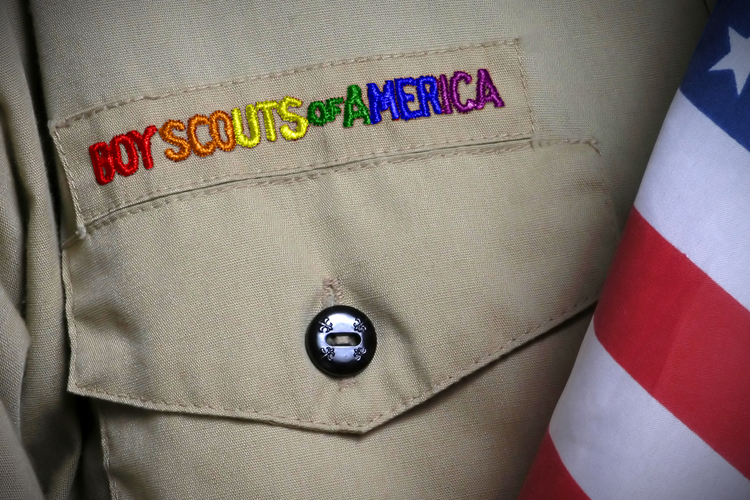Morally Straight Becomes Less Narrow

The Scouts beat the Methodists.
On July 18, the Scout Executive announced that the policy forbidding gay adults from serving as Cub and Boy Scout leaders had been revoked. Chartering organizations still have final say in whom is qualified to lead a pack or troop, meaning churches may continue to discriminate, but the national organization no longer ties the hands of those sponsors who seek to remove sexual orientation from their lists of qualifications.
Putting the decision in local hands was not enough for a number of churches, who promptly disavowed their association with Scouting. The radical religious right will continue to bury its head in the sand of denial even as it goes on blindly lashing out at people whose identity is itself sinful by their definition. Consequently, evangelicalism continues its slide deeper into irrelevance. By the time Millennials are fully in charge of this nation's government and other institutions, conservative Christians will be little more than a fringe movement.
This is the issue that caused me to separate myself from both Scouting and the church that was my spiritual home for most of my life. While I never mailed my Eagle badge to the Scout Executive--as thousands of my peers did in mournful, but futile, protest--I stopped being a Scout leader the day my son announced he was fed up with Scout meetings. His was not a conservative troop--had any of the other assistant scoutmasters been gay, I expect he or she would've been treated with the same respect I always experienced--but just as conservative churches are now rejecting any association with the national organization over its new, more open policy, I finally couldn't continue to associate with the homophobia it embraced in the early 2000s. This mirrored by gradual drift from United Methodism: I was a member of the most radically inclusive congregation I am aware of existing in the entire denomination, but over the years, the never-ending rejection of my gay sisters and brothers by the greater Connexion finally wore me down. As with Scouting, I never completely gave up hope--unlike a number of my peers in the Methodist ministry, I did not burn my certificate of ordination, and continue to have the status of "honorably located"--but I just can't be comfortable calling myself Methodist.
With the Supreme Court's same-gender marriage decision, I felt the advance of equity on orientation issues snowballing. It seemed like all the institutions that have refused to acknowledge the full humanity of these persons must eventually knuckle under, especially as the young adults who are now maturing into leadership in them are overwhelmingly supportive of full inclusion, and that seems to have been the case with Scouting. Part of "being prepared" is the pragmatic understanding that conditions change: no matter how sunny it is at the beginning of a hike, one packs rain gear; when taking a day hike on a mountain, one packs emergency shelter; and so on. Cultural conditions have changed now to the extent that maintaining a policy of discrimination is no longer tenable. If Scouting was going to be a national organization truly representative of, and serving, a broad spectrum of American youth, it had to reflect that spectrum in its leadership.
The history of Methodism in America has, like Scouting, been one of pragmatism. Separated from America by an ocean, John Wesley took it upon himself to ordain circuit riders and commission "general superintendents" of the American church, knowing that, without such revisions of the traditional understanding of ordination, there would soon be no Methodists in the colonies. Empowered by Wesley's actions, American Methodists engaged in their own reinvention of the church, turning those superintendents into bishops, liberating circuit riders from the need to attend seminary by creating a course of study (hence the familiar image of the circuit rider reading a book as he travels between charges), commissioning yet-to-be-ordained preachers to preside over the sacraments, and finally giving circuit riders the right to locate--settle down--once they were married. This spirit of pragmatic reinvention continued well into the twentieth century. Unfortunately, beginning in the 1970s, United Methodism began to ossify. Bishops became politicians and technocrats rather than prophetic spiritual leaders, conservative elements within the church demanded adherence to what they considered orthodox doctrine, and the megachurches of the South became the tail that wagged the dog. More recently, the growth of United Methodism in Africa, among Methodists who learned Christianity from homophobic American missionaries (many of them not even Methodist), has fueled the fires of continued discrimination and outright hostility.
United Methodism has lost its spirit of pragmatic innovation and flexibility. Conservatives dictate doctrine to the rest of the church, and bureaucratic habits prevent progressives from protesting in any but token ways. Fear of losing appointments, or of facing church trials, keeps both the clergy and episcopacy from performing marriages and ordinations they may personally believe are right and good, but know to be chargeable offenses under the Discipline; or, perhaps worse, of sanctioning such acts by pretending not to know the sexual identity of the persons involved. "If your heart is as my heart, then take my hand," Wesley's famous aphorism of ecumenism, now has a footnote: "Just please don't mention what you do with your genitals, or I'll have to slap that hand away."
United Methodist congregations sponsor more than 10,000 Scouting units. Wouldn't it be wonderful if the Scouts could literally scout the way to full inclusion within the denomination? Nothing could make me happier than to see the church following in the footsteps of the bright young people it hosts, embracing the gay men and women who want so badly to be able to serve openly.


Comments
Post a Comment